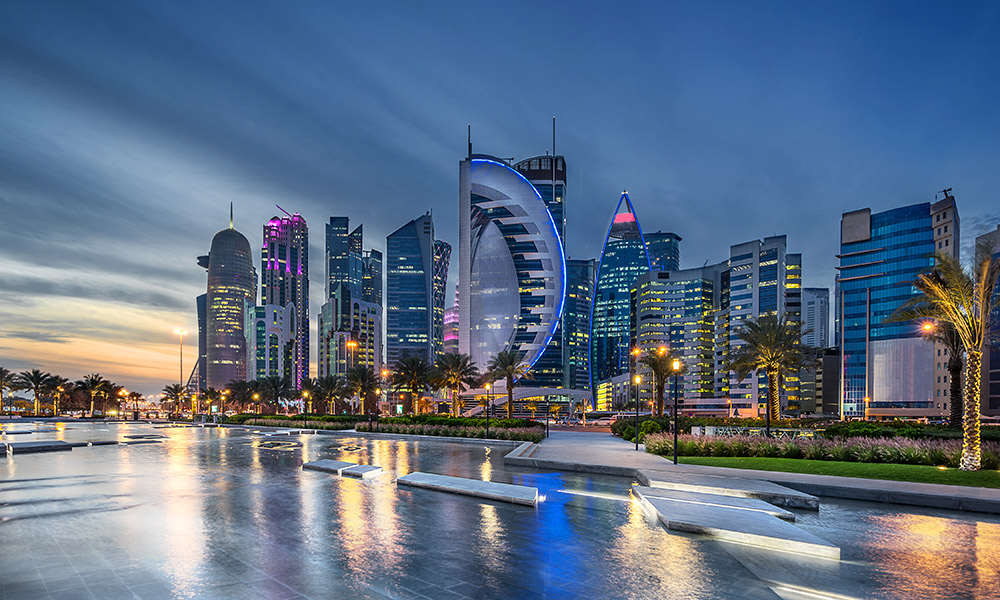Qatar’s hospitality sector to grow by 89% by 2025 predicts Knight Frank
Firm says that tourist arrivals are slowly recovering in Qatar, as authorities begin to scale back COVID-linked travel restrictions

According to research by Knight Frank, Qatar could see its hospitality sector grow by 89% to over 56,000 keys by 2025. The delivery of the planned hotel room supply will cost approximately US $7bn, the firm said.
“Officially, around 30,000 keys had been delivered by the end of 2021, and we estimate that another 3,800 keys will have been delivered by the time the World Cup commences next month. In addition, Qatar’s hotel capacity will be temporarily boosted by an additional 3,900 cabins in two luxury cruise ships moored off the coast; and a third is being planned. In addition, cabin-style rooms across seven fan villages, designed to house the one million fans expected to descend on the State during the World Cup are also being rapidly assembled,” said Adam Stewart, Partner – Head of Qatar at Knight Frank.
He added, “Looking beyond the World Cup, however, reveals some incredible ambitions. The tourism and hospitality sector is expected to contribute 12% of GDP by 2030, making it worth about $55bn, by which time tourist arrivals are forecast to be closing in on seven million.”
In August 2022, Saudi Arabia opened its expanded Salwa border crossing facility with Qatar.

The firm notes that tourist arrivals are slowly recovering in Qatar, as the authorities begin to scale back COVID-linked travel restrictions, with arrivals from the GCC states already starting to exceed pre-pandemic levels. That said, visitors from India, which has historically been the biggest source of inbound arrivals are still about a third lower than they were in 2019, it stated.
Faisal Durrani, Partner – Head of Middle East Research, Knight Frank remarked, “While there is palpable excitement in Doha as the FIFA World Cup draws near, for the country’s hospitality sector the best is yet to come. Indeed, with nearly 27,000 hotel keys expected to be delivered in the next three years, there will be a phenomenal change in Qatar’s hotel offering by the end of 2025. The near doubling in capacity to over 56,000 rooms will be in a post-World Cup environment and comes as the country prepares for an anticipated visitor influx following heightened interest in Qatar once the excitement of the World Cup subsides.”
He elaborated, “Indeed, with new theme park attractions planned in Lusail such as the new Winter Wonderland and Aquatar on Qetaifan Island, which promises to deliver the world’s tallest waterslide, the seeds of a vibrant tourism and hospitality market are starting to take shape.”
In August 2022, the Arab Engineering Bureau spoke to Big Project Middle East about how it utilised Bentley System’s RAM Concept to deliver the Rosewood Doha.

The firm said its research also discovered that a change in the country’s top hotel operators is expected by 2025. It noted that IHG will drop out of the top three by number of rooms under management in the country by then.
Durrani stated, “The Marriott Group will continue to fortify its position as Qatar’s leading hotel operator, with about 8,800 rooms under management by 2025, up 152% on today. Accor and Hilton Hotels & Resorts will round off the top three, together controlling nearly 19,000 rooms, or a third of total hotel keys. The big change however will be in the form of IHG slipping to fourth place, with about 3,500 rooms, from second place today.”
Knight Frank’s analysis also shows international operators claiming a larger market share by 2025. Stewart explained, “Interestingly, by the end of 2025, international hoteliers will control 62% of Qatar’s hotel keys, up from 59% today. In reality this could be even higher as 17% of rooms are yet to be allocated to an operator.”
In early October 2022, JLL signed an agreement with a Qatar real estate brokerage to boost property investments.

Knight Frank’s analysis also revealed that 76% of planned rooms will be classed as either four- or five-stars. Today, 69% of Qatar’s hotel rooms fall into this category.
Turab Saleem, Partner – Head of Hospitality, Tourism and Leisure said, “Like other markets in the region, the focus is very much on the higher end of the price spectrum. Just 14% of the expected hotel keys are in the three star and lower category; however, this is the segment that could present the greatest opportunity to transform Qatar’s appeal to a wider audience, particularly in the wake of the World Cup which will put the country in the global spotlight”.
Durrani concluded, “One consideration for operators will be to actively target tourists looking for affordable, or budget-holidays, perhaps through the provision of all-inclusive packages which are already very popular in markets such as Spain, Greece, Turkey and the Caribbean.”
























